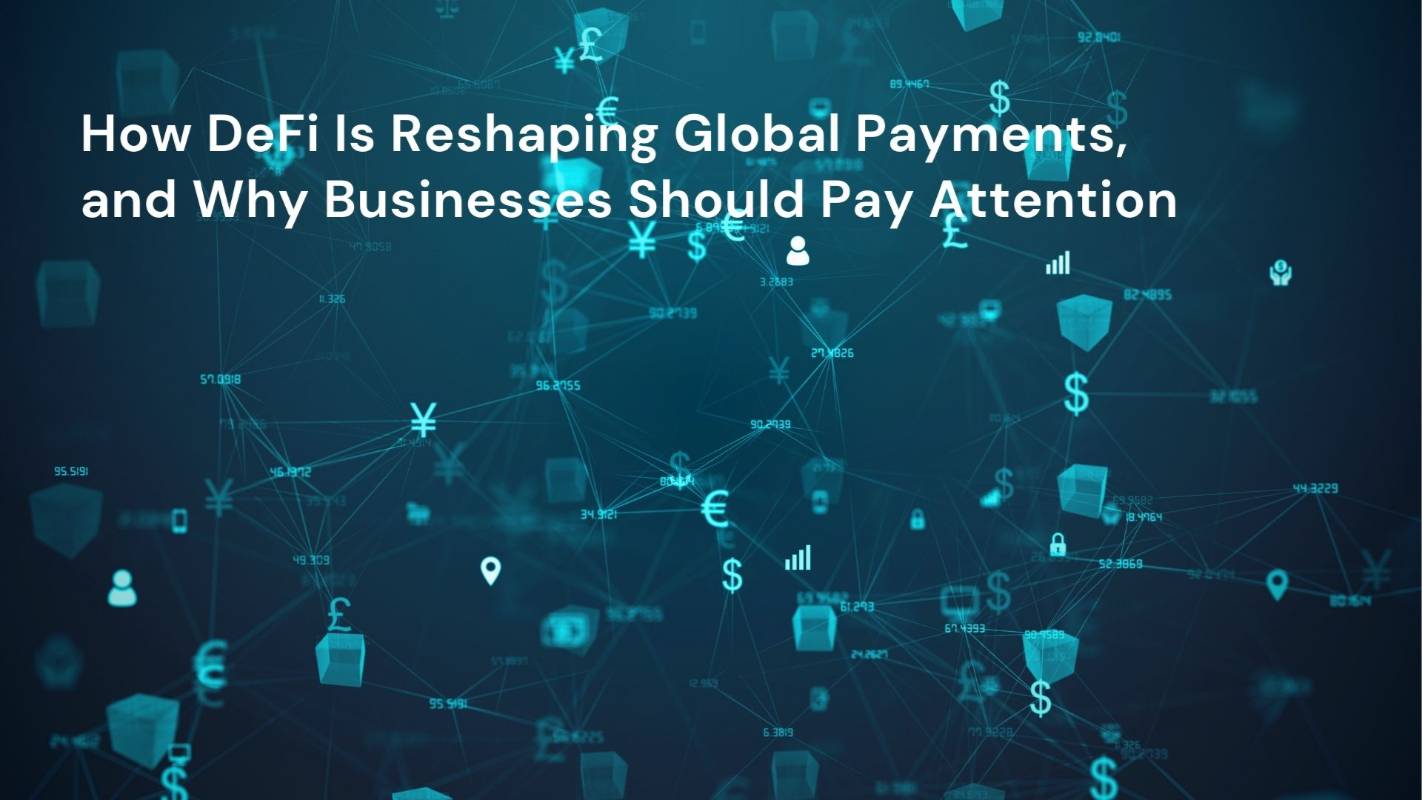Decentralised Finance (DeFi) is reshaping the global financial landscape by removing intermediaries from everyday financial transactions through blockchain technology. This innovation opens the door for businesses to interact with global markets in faster, more secure, and more transparent ways.
What is DeFi?
DeFi encompasses blockchain-based financial services that operate through peer-to-peer systems, bypassing traditional banking institutions and making transactions like borrowing, lending, or trading more efficient and accessible. For example, instead of applying for a loan through a bank, you can use a DeFi platform to lend or borrow digital assets directly, without delays or heavy fees. The decentralised model also improves transparency and trust, thanks to its open-source and immutable nature.
Key components of DeFi
The DeFi ecosystem is powered by several integral components, each bringing unique value to the payment and financial process:
- Decentralised exchanges (DEXs): These platforms allow direct asset trading between users, cutting out intermediaries and minimising costs while enhancing privacy and control.
- Lending protocols: By using these protocols, you can earn interest on idle crypto assets or access funding without extensive paperwork or credit scoring.
- Stablecoins: Designed to maintain a stable value by pegging to fiat currencies, stablecoins are ideal for day-to-day transactions and help protect against the typical volatility of other cryptocurrencies.
- Yield farming: This practice lets users provide liquidity to DeFi projects in return for rewards, offering a way to generate passive income from digital assets.
- Smart contracts: These self-executing contracts streamline transactions and reduce the risk of errors, helping businesses automate operations with confidence.
By integrating payment solutions like Bitpace, your business can tap into the potential of DeFi, offering borderless, efficient, and secure payment experiences that align with the expectations of today’s digital-first customers.
The impact of DeFi on global payments
DeFi is redefining the way global payments function, offering businesses new efficiencies and access to broader markets. Understanding these shifts is essential for companies looking to future-proof their operations and stay competitive.
Greater financial accessibility
One of the most transformative aspects of DeFi is its ability to broaden access to financial services. Traditional banking systems often exclude individuals in underserved regions due to high costs or limited infrastructure. DeFi removes these barriers by offering permissionless, low-cost platforms where users only need internet access and a crypto wallet. This empowers your business to engage directly with the over 560 million crypto users worldwide, many of whom are unbanked.
Decentralised platforms operate around the clock, without downtime or the constraints of conventional banking hours. This always-on availability ensures that your business can facilitate transactions at any time, improving liquidity, enhancing customer satisfaction, and creating new opportunities for growth across time zones.
Lower transaction costs
Another major benefit of DeFi is its cost-effectiveness. By removing intermediaries from the equation, DeFi drastically reduces transaction fees. With a crypto payment gateway like Bitpace, your business can send and receive payments instantly at a fraction of the cost of legacy systems such as SWIFT or SEPA.
DeFi also offers near-instant settlement, meaning funds arrive faster, allowing for better cash flow management. Unlike traditional services that often apply variable fees, DeFi platforms typically charge flat rates, regardless of transaction size. This predictability supports leaner margins and more efficient scaling.
By adopting DeFi solutions, you can streamline your operations, reduce overheads, and reinvest the savings into improving your services, creating a more agile, customer-centric business ready to thrive in today’s global economy.
How businesses benefit from DeFi adoption
Decentralised Finance (DeFi) is transforming how businesses operate by introducing innovative tools that streamline financial processes and unlock new markets. Embracing DeFi gives your business a strategic edge in an increasingly digital global economy.
Boosted operational efficiency
DeFi solutions are built on blockchain infrastructure, which dramatically accelerates transaction speed and settlement times. Unlike traditional banking systems that rely on intermediaries and fixed operating hours, decentralised platforms operate 24/7, allowing your business to process transactions anytime, without delays.
By using a DeFi-enabled crypto gateway like Bitpace, you can process payments almost instantly, keeping pace with fast-moving customer expectations. The integration of smart contracts automates routine financial functions, reducing the risk of human error and minimising manual intervention. These efficiencies allow your team to focus more on core business initiatives while ensuring a smooth and reliable customer payment experience.
Global market expansion
DeFi improves efficiency, and it expands access. Traditional banking systems often exclude individuals in remote or underserved regions, but DeFi allows you to connect with these audiences directly. With Bitpace, you can accept crypto payments from customers worldwide, including those without access to conventional financial services.
Stablecoins, a key component of DeFi, further enhance your ability to transact across borders by offering price stability and minimal volatility. This enables predictable, secure, and cost-effective cross-border commerce. By adopting DeFi-powered payment solutions, your business becomes more inclusive, agile, and ready to capture new opportunities in diverse markets.
Key challenges and risks in adopting DeFi
While DeFi offers exciting opportunities for innovation, businesses must also be aware of the inherent challenges that come with integrating decentralised finance into their operations. Two major areas of concern are regulation and security.
1. Navigating the regulatory landscape
One of the most complex aspects of DeFi adoption is the evolving regulatory environment. Since DeFi operates largely outside traditional frameworks, businesses can face ambiguity when it comes to compliance. As regulatory bodies work toward clearer guidance, expected to ease in 2025, staying informed becomes essential for avoiding penalties and ensuring long-term stability.
Businesses looking to implement DeFi-based payment systems should take a proactive approach to compliance. For example, integrating built-in compliance tools through platforms like Bitpace can help ensure adherence to local and international regulations. With policy requirements varying widely between jurisdictions, having flexible and adaptable systems in place is key to mitigating legal risks.
2. Addressing security risks
Security is a top priority in any financial environment, and DeFi is no exception. While smart contracts power automation within DeFi, they can sometimes harbour vulnerabilities that malicious actors exploit. These flaws can result in serious financial consequences if left unaddressed.
That’s why it’s crucial to use secure payment solutions like Bitpace, which employ encryption and authentication protocols to safeguard every transaction. In addition, businesses should regularly audit smart contracts and perform system checks to detect potential weaknesses early.
Liquidity challenges during volatile market periods can also impact the effectiveness of DeFi-based transactions. By implementing strong risk management policies and training your team on emerging threats, you can build a resilient and secure foundation for DeFi integration.
The future of DeFi in global transactions
Decentralised Finance (DeFi) is reshaping global payments, offering a dynamic alternative to traditional financial systems. As these technologies continue to evolve, businesses that embrace them early can gain a substantial advantage in speed, reach, and cost efficiency.
Trends to watch
A few transformative trends are redefining how payments work in the DeFi landscape. Blockchain technology is leading the charge, drastically improving transaction speed and reliability. By enabling direct, peer-to-peer transactions, it removes the need for intermediaries, helping businesses lower costs while boosting efficiency.
The adoption of open banking APIs is accelerating as well, allowing seamless integration between DeFi tools and existing financial infrastructures. This enables you to offer smooth, cross-platform customer experiences. Meanwhile, decentralised exchanges (DEXs) are growing in popularity, supporting around-the-clock trading that improves liquidity and market accessibility.
Stablecoins also continue to gain ground as a trusted medium for international transactions. By reducing volatility, these digital assets make global commerce more predictable and manageable for both businesses and consumers.
Potential developments
The coming years are likely to see broader DeFi adoption, especially as businesses seek faster, cheaper, and more inclusive payment solutions. With DeFi, you can remove traditional banking obstacles and tap into underserved markets that were once out of reach.
Regulatory developments will play a central role in shaping this future. As governments introduce clearer frameworks for DeFi activities, staying updated will be key to avoiding compliance issues while still capitalising on innovation.
Security and system compatibility will remain top concerns. Strengthening your payment infrastructure with secure platforms like Bitpace can mitigate these risks. Additionally, industry-wide collaboration between businesses, tech providers, and regulators is expected to improve interoperability and trust across DeFi systems.
Adopting DeFi today means preparing your business for tomorrow’s financial landscape. It offers the tools to modernise payment processes, reduce costs, and expand globally. By staying agile and informed, you position yourself to meet the rising expectations of your customers and lead in a more decentralised economy.
Start accepting stablecoins with Bitpace’s crypto payment gateway
Get paid in Bitcoin, Ethereum, Litecoin, and many more established cryptocurrencies with the Bitpace crypto payment gateway. Reach out now to start accepting crypto payments.





